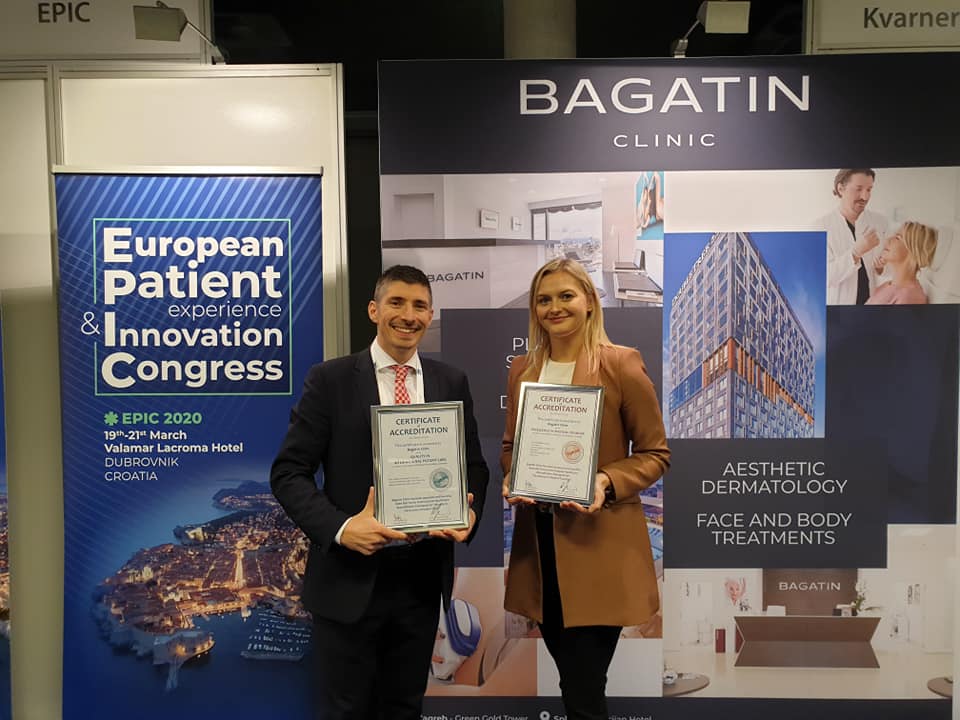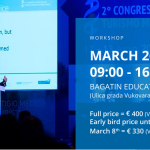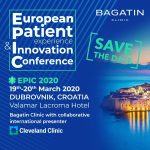January 4, 2020 – TCN attended the International Medical Travel Journal 2019 conference, during which we caught up with TEMOS co-host CEO Claudia Mika to talk about medical tourism accreditation, the accreditation awarded to Bagatin Clinic, and Croatia.
Tell us firstly about TEMOS and the accreditation you offer.
TEMOS International Healthcare Accreditation is an international accreditation body located in Germany in Cologne, with 14 international offices worldwide. It started ten years ago as a scientific research project. I was working for a government research organisation and there was a funded government project together with insurance companies and assistance companies to define quality criteria for the management of international patients worldwide. And from there, we further developed. First we closed the project. As a government research project, you are not allowed to earn money with those products, so I was asked as project manager to do a spin-off. I learned how to write a business plan and how to do business, and we started. And since then we have been accrediting and certifying hospitals and clinics, and medical centres worldwide. Those who do treat international patients, medical tourists, and those who do not, we are also an accreditation body for those facilities who do not deal with international medical tourists.
How many clinics worldwide have the TEMOS accreditation?
We currently have around 65 accredited certificates distributed, from Colombia to Thailand.
Tell us about the process of getting accreditation.
The process is that, having agreed with the clinic or hospital that we would like to start the process together, our applicants are given online access to our platform. They get the standards and the self-assessment tools where they can do their own analysis. They get a questionnaire where we have translated all the standards into questions because we know that the language of quality is sometimes difficult to understand. We ask, do you have this, how are you doing that? This was we avoid the cost of expensive consultancy, as the client can learn by doing, it is like a self-learning and improvement tool. And, of course, we are responsive to any questions they may have, and they always receive an answer within 24 hours.
What is the success rate of application to accreditation?
We changed the system about a year ago, when we reviewed all the standards, and after this, the success rate was a little worse than before. We have three scores – passed, not passed, and passed on reservation. We always try to avoid the ‘not passed’ as it is frustrating for both sides. What we have seen recently has been an increase in ‘passed on reservation.’ This means that the organisation needs to show by means of a progress report that within a given timeframe, say 6-9 months, that they will successfully work on all the points. And that if they do, we can then confirm that they are compliant with our standards, and then we can delete the ‘with reservation’ and upgrade them to a full ‘passed.’
I hear a lot of accreditations within the industry. How does TEMOS stand among them, and what makes it different? I assume that there are similar products out there?
There are maybe some similar, but none the same. Since we are ISQua/IEEA-accredited, of course we are competing with those accreditation bodies which are also accredited by ISQua/IEEA. But the accreditation by ISQua/IEEA means that you must fulfil these standards, but that you do not need to stop with these standards. So you can add additional standards, and this is what TEMOS did. So we are unique for some of the chapters and standards we have. For example, we implemented the International Patient Management, the complete process of the international patient department services, from the first contact from the patient until the follow-up. We also have a chapter called Sustainability in Healthcare Settings for organisations, which means that we ask about their contribution to the environment and carbon footprint. No other accreditation business has this as a chapter. We ask about legal aspects, ethical aspects in separate chapters, and this is what we have found important, especially in international patient management, to cover those standards. In this respect, TEMOS does not really have a competitor. The others generally only check what is happening with international patients, or with domestic patients. But the combination of domestic and international, that is not available from anyone else. A clinic gets the TEMOS accreditation, which is good PR and adds a layer of trust.
Are there any other perks to getting the accreditation?
Yes, indeed. As co-hosts of this conference, for example, all our network partners were invited, and many came. We also have the TEMOS Academy, where all partner clinics have access to education, to further development. We do have reference letters from assistance companies representing the health insurances. We also have an exclusive partnership with Diplomatic Council (DC), a United Nations (UN) accredited business club and think tank. They have more than 5,000 members worldwide. Only Temos accredited organizations receive an additional certificate “DCpreferred partner hospital/clinic/medical travel coordinator”. We are always trying to extend the network to give further benefits once a clinic is accredited, because we want to offer much more than just the accreditation.

(Bagatin Clinic received the TEMOS accreditation during the IMTJ conference in Berlin)
Let’s talk a little about medical tourism in Croatia and Bagatin Clinic, which was awarded the TEMOS accreditation during the IMTJ conference in Berlin. You have a much more global viewpoint that I do, as I live in Croatia.
I have known Ognjen Bagatin now for 6-7 years, from the international business perspective. And for me – totally independent of the fact that his clinic just got the TEMOS accreditation – he is clearly an ambassador. An ambassador for the business, and an ambassador also for Croatia as a country. He is a very engaged person with lots of experience, who is very motivated about what he is doing. He really wants to push the business, he wants to involve partners, he wants to network, he wants to cooperate. It is not that he wants to be successful for himself and his clinic, but he wants others to contribute and to benefit from what he is trying to build up. And what he is doing is amazing, and I appreciate what he is doing very much.
And where does Bagatin Clinic stand on the global stage? Are they players on the international stage?
Bagatin is definitely a player but also it is a best practices example for many clinics worldwide. When I talk to people who see his presentations as they comment on how amazing it is what they have achieved and how far they have gone in a short space of time, it is also amazing to see how much is invested in promotion. He is a best practices example because he has facts. He shows and he shares. He knows exactly what is going on in his clinic, and he shares this knowledge, and it is very much appreciated, especially in our business where facts are so important and not so many people share. This is why so many people are listening to him, because he is one of the rare ones who shares. And he is so far ahead that he really doesn’t have to worry about others overtaking him.
Let’s talk about Croatia. Where do you see the Croatian medical tourism industry, in terms of potential fulfilled, and where it could and should be?
I think Croatia has an advantage – and it really is a huge advantage – that Croatia already has a lot of tourism, as well as a great reputation for that tourism. So as a country it is regarded as neutral in terms of political issues, which can be an important issue these days, and it is famous for tourism, for its excellent food and wines. This is definitely a big advantage to promote Croatia as a medical tourism destination. I also think that there are some good initiatives coming out of Croatia. One of them is obviously Ognjen and his Bagatin team, and the other great example is the Kvarner Health Cluster. They have been working very hard for a number of years for the promotion of Kvarner as a health tourism destination.
Ok, but these initiatives are essentially private ones – one clinic in Zagreb and one health cluster on the coast.
Yes, Croatian medical tourism has evolved from private initiatives. Perhaps the government could and should do more to support it, but Croatian clinics have that international quality, as Bagatin has demonstrated for example. It also has a high-quality tourism offer as mentioned above and is a safe country. Clinics do not need the country to be branded as a medical tourism destination to succeed. If they have the quality and reputation, aligning to the current tourism traffic will enable them to succeed. There is very little in terms of government involvement in Croatia, but there are pros and cons. Croatia is a very small country, and the initiative is coming from those private players. Just because there is no coordinated government initiative, this does not mean that clinics cannot succeed. There may be no brand of Croatia as a medical tourism destination, but there is a huge brand of Croatia as a tourist destination, and that is something to build on. Because of this, and because Croatia is safe, if people see a famous clinic with best practices and international accreditations, they will go there.
You have also fallen in love with Croatia as a holiday destination.
I got to know Croatia through my business. I was invited to speak at conferences in Zagreb and Kvarner. I saw a bit of the country and I was very impressed. Very beautiful, with great people, food and wine. So I suggested to my husband that we go on holiday. So the first year we went to the islands of Cres and Vis, as well as Istria. So we asked our Croatian friends for recommendations, and they sent us to Hvar. We went there last summer, and we really enjoyed it. The weather was fabulous, and again, beautiful people, food and wine. It is definitely not our last time on holiday in Croatia. We love it.
To learn more about TEMOS, visit the official website.
For the latest from the Croatian medical tourism industry, follow the dedicated TCN section.










